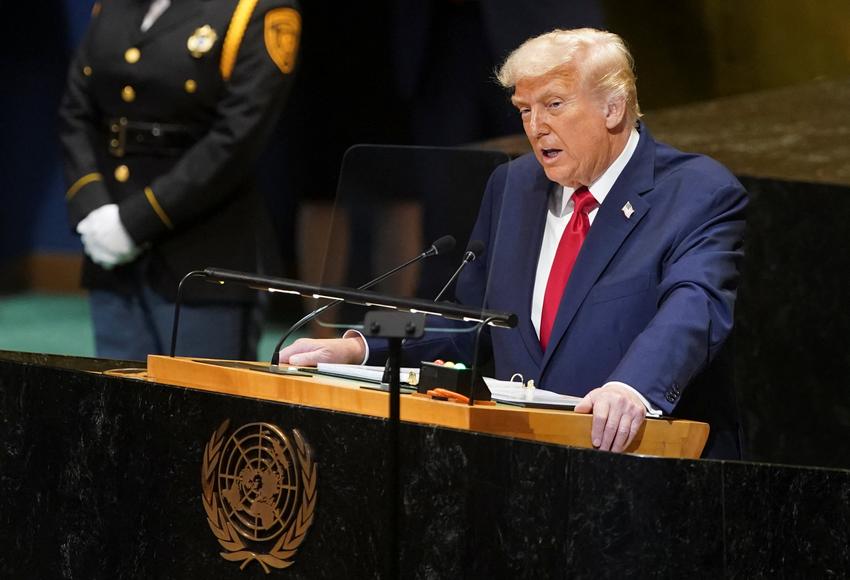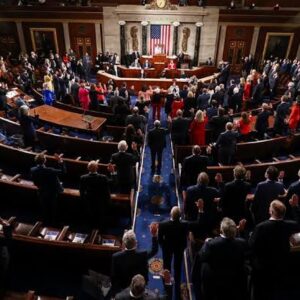
President Donald Trump’s administration on Wednesday froze $26 billion for Democratic-leaning states, following through on a threat to use the government shutdown to target Democratic priorities.
The targeted programs included $18 billion for transit projects in New York, home to Congress’s top two Democrats, and $8 billion for green-energy projects in 16 Democratic-run states, including California and Illinois. Vice President JD Vance, meanwhile, warned that the administration might extend its purge of federal workers if the shutdown lasts more than a few days.
The moves made clear that Trump would carry out his threat to take advantage of the shutdown to punish his political opponents and extend his control over the $7 trillion federal budget, established by the U.S. Constitution as the domain of Congress.
The pressure tactics came as the 15th government shutdown since 1981 suspended scientific research, financial oversight, environmental cleanup efforts and a wide range of other activities.
Some 750,000 federal workers were ordered not to work, while others, such as troops and Border Patrol agents, began to work without pay. The Department of Veterans Affairs said it would provide burials at national cemeteries, but would not erect headstones or mow the grass.
Vance said at a White House briefing that the administration would be forced to resort to layoffs if the shutdown lasts more than a few days, adding to the 300,000 who will be pushed out by December. Previous shutdowns have not resulted in permanent layoffs.
The U.S. Patent and Trademark Office said it would lay off 1% of its 14,000 employees, according to an internal letter seen by Reuters.
Hakeem Jeffries, the top Democrat in the House of Representatives, said the funding freeze for subway and harbor projects in his home of New York would throw thousands out of work.
Top Senate Democrat Chuck Schumer, also from New York, said Trump was targeting regular Americans for partisan aims.
“He is using the American people as pawns, threatening pain on the country as blackmail,” Schumer said.
Republican Senator Thom Tillis said he was concerned that the freezing of infrastructure funds for New York could make it harder for Congress to exit the shutdown.
“They need to be really careful with that, because they can create a toxic environment here,” Tillis said. “So hopefully they’re working with the leader, and the leader with them, on not creating more work to get us out of this posture.”
Republican Senate Leader John Thune dismissed concerns that the spending freeze amounted to hostage-taking.
“Well, vote to open up the government and that issue goes away, right? I mean, it’s pretty straightforward,” he said at a press conference.
Meanwhile, the Senate again rejected efforts to keep the government functioning as both a Republican proposal that would fund the government through November 21 and a Democratic vote that would pair funding with additional health benefits failed in floor votes.
Trump’s Republicans hold a 53-47 Senate majority, but they need the support of at least seven of Schumer’s Democrats to meet the chamber’s 60-vote threshold for spending bills.
At issue on the government funding front is $1.7 trillion for agency operations, which amounts to roughly one-quarter of annual spending. Much of the remainder goes to health and retirement programs and interest payments on the growing $37.5 trillion debt.
A bipartisan group of senators huddled on the floor during the vote, trying to find a path forward.
“I want to see that a deal is a deal, and I would like to see the Republicans make a commitment to work with us on health care,” said Senator Tim Kaine, a Virginia Democrat who represents many federal workers near the nation’s capital. “But I’ve never said that has to be all I’s dotted and T’s crossed because that could be complicated.”
Democrats are also seeking guarantees that Trump will not be able to ignore spending bills he signs into law, as he has repeatedly done since returning to office.
Both sides sought to pin the blame on the other, looking for advantage ahead of the 2026 midterm elections that will determine control of Congress.
Democrats said Republicans were responsible for the disruption, as they control the levers of power in Washington.
Republicans said Democrats were surrendering to partisan pressures to oppose Trump, even though they have routinely backed spending bills in the past. They also repeated a false claim that the Democratic proposal would extend health coverage to people who are in the country illegally. According to the nonpartisan Congressional Budget Office, the Democratic plan would only restore coverage to certain categories of immigrants who are in the country legally, such as asylum seekers and people on work visas.
Several government agencies posted notices on their websites blaming the “radical left” for the shutdown – a possible violation of a law known as the Hatch Act meant to insulate nuts-and-bolts government services from partisan politics.
The longest U.S. government shutdown, which stretched over 35 days in 2018-2019 during Trump’s first term, ended in part after flight delays caused by air traffic controllers calling in sick. (JapanToday)



